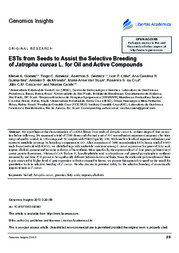ESTs from seeds to assist the selective breeding of Jatropha curcas L. for oil and active compounds.
ESTs from seeds to assist the selective breeding of Jatropha curcas L. for oil and active compounds.
Author(s): GOMES, K. A.; ALMEIDA, T. C.; GESTEIRA, A. da S.; LÔBO, I. P.; GUIMARÃES, A. C. R.; MIRANDA, A. B. de; VAN SLUYS, M. A.; CRUZ, R. S. da; CASCARDO, J. C. M.; CARELS, N.
Summary: We report here on the characterization of a cDNA library from seeds of Jatropha curcas L. at three stages of fruit maturation before yellowing. We sequenced a total of 2200 clones and obtained a set of 931 non-redundant sequences (unigenes) after trimming and quality control, ie, 140 contigs and 791 singlets with PHRED quality $10. We found low levels of sequence redundancy and extensive metabolic coverage by homology comparison to GO. After comparison of 5841 non-redundant ESTs from a total of 13193 reads from GenBank with KEGG, we identified tags with nucleotide variations among J. curcas accessions for genes of fatty acid, terpene, alkaloid, quinone and hormone pathways of biosynthesis. More specifically, the expression level of four genes (palmitoyl-acyl carrier protein thioesterase, 3-ketoacyl-CoA thiolase B, lysophosphatidic acid acyltransferase and geranyl pyrophosphate synthase) measured by real- time PCR proved to be significantly different between leaves and fruits. Since the nucleotide polymorphism of these tags is associated to higher level of gene expression in fruits compared to leaves, we propose this approach to speed up the search for quantitative traits in selective breeding of J. curcas. We also discuss its potential utility for the selective breeding of economically important traits in J. curcas.
Publication year: 2010
Types of publication: Journal article
Unit: Embrapa Cassava & Fruits
Observation
Some of Embrapa's publications are published as ePub files. To read them, use or download one of the following free software options to your computer or mobile device. Android: Google Play Books; IOS: iBooks; Windows and Linux: Calibre.
Access other publications
Access the Agricultural Research Database (BDPA) to consult Embrapa's full library collection and records.
Visit Embrapa Bookstore to purchase books and other publications sold by Embrapa.

